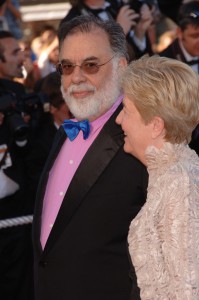 Vanessa, 38, joins her sister Lorena and brother-in-law, winemaker Rolando Herrera, as CEO of their Napa Valley winery, Mi Sueno.
Vanessa, 38, joins her sister Lorena and brother-in-law, winemaker Rolando Herrera, as CEO of their Napa Valley winery, Mi Sueno.
Mi Sueno, founded in 1997, means “my dream” in Spanish.
Before reeling through the Q&A, here’s a recap of Vanessa’s backstory.
Vanessa, you recall, turned heads when she was president of Sonoma’s Robledo Family Winery. She grew the business from a 100-case producer in 1997 to a 20,000 cases a year in 2007. Vanessa targeted the affluent Hispanic middle class, and taught wine pairing using her mother’s traditional Mexican dishes at winery events.
In 2008 Vanessa decided to strike out on her own and joined Black Coyote Chateau, a small producer of award-winning Napa Valley cabernet sauvignon. She again drew attention by establishing Black Coyote as a multicultural brand with national distribution in 18 states. She also increased direct consumer sales and wine club membership 100 fold.
At Mi Sueno, Vanessa will have a higher profile and broader responsibilities than she had at Black Coyote.
As for the Robledo Family Winery, it’s now owned by Vanessa’s brother, Everardo Robledo. There were court battles with some family members before Everardo became the official owner in 2013.
The Robledo story begins with their father, Reynaldo Robledo, who came to America when he was 16. He set a record by opening the first tasting room in the United States by a former Mexican migrant vineyard worker. (People magazine did a 2-page spread on Robledo’s story in Aug. of 2005.)
Vanessa also is making breakthroughs of her own. In 2015 she was awarded “Woman of the Year” by the Napa County Hispanic Chamber of Commerce and Marin Hispanic Chamber of Commerce. Author Rhoann Ponseti wrote, “She is not only the American dream personified, she is reinventing that dream as she goes along, serving as a bridge over cultures, gender, wine industry, age and family stereotypes.”
Here’s the Q&A with Vanessa, who continues to turn heads.
Q: Who was your role model growing up and for what reasons?
A: My role model is my mother, Maria de La Luz Robledo. Maria is the most remarkable woman I know. She was always cooking, cleaning, and helping my father work in the vineyards, and raised seven sons and two daughters. She never once would say anything negative. Instead, she was always smiling, loving life, and would always scold me for not learning her Mexican recipes. I have her strong work ethic and I strive to master her optimistic mind set. I still can’t cook as well as my mother, but I have perfected the art of pairing wine with each of her dishes.
Q: In what ways do you want to inspire others? How do you actively go about this?
A: I would like to inspire others by promoting the importance of education. A few years ago I was fortunate to support a small preschool for underserved children in Sonoma Valley. Most of the 21 students were Spanish speakers. Growing up in the public school system I quickly learned English because in the 80’s my brother and I were the only Spanish speaking kids in our class. Today, if you walk in the same classroom you will see that many of the kids are Spanish speakers. Due to culture shock and language barrier young students quickly fall behind in our school system, especially without attending preschool or being exposed to earlier education. This opportunity taught me the importance of early education for students whose parents support our wine, food, and hospitality industries.
Q: What insights can you give us about growing up steeped in your traditions, while at the same time you were immersed in the American culture? What did each teach you? How do you integrate them?
A: I am very fortunate to have grown up in a multicultural family. My sister Lorena, seven brothers, and I were raised in Napa. In our home we were only allowed to speak Spanish and were exposed to strong Mexican traditions from the folkloric walls to the smell of my mom’s Mexican cuisine. When I would step outside of my front door and go to school I felt liberated because I liked being seen as an equal. In our family the women had disciplined roles. At school those rules or limitations did not exist.
I learned to appreciate my culture more later in life. When I was in my twenties and president of my family winery I traveled nationally to represent our wines. Because I am a woman I had to be escorted by one of my seven brothers to all my sales trips. When I would travel to NYC I had to bring two of my brothers because my parents believed it was the most dangerous city in the U.S. When I left the family winery to pursue my dreams I learned to appreciate the importance of family and no longer having the luxury of traveling with my brothers to help with my bags.
I integrate both my American and Mexican culture in the businesses I work in by pairing Mexican food with wine.
Q: What are your plans to reach out to Hispanics and Millennials? How important are each to your market?
A: The Millennials are a very important part of our economy making up approximately 80 million of our population in the U.S. Although, not all are 21 yet.
At Mi Sueno Winery we like to be inclusive and equally target all generations. One of the ways we will reach out is by hosting educational seminars, establishing private clubs, and cultural events.




